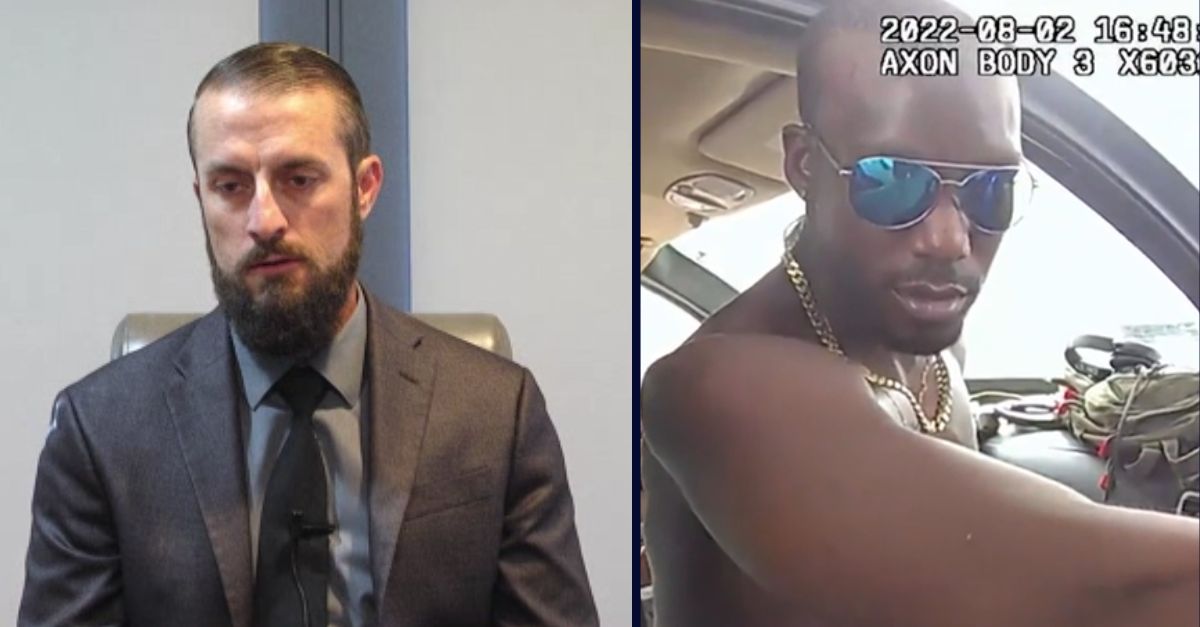
Left: Brad Lunsford (The Kennedy Law Firm, P.C.). Right: Presley Eze (Las Cruces Police Department).
A New Mexico police officer awarded a new trial following his conviction for killing a Black man who allegedly stole a $2 beer has been sanctioned by a judge in his civil case for deleting text messages.
Las Cruces police Officer Brad Lunsford was convicted earlier this year of voluntary manslaughter in the 2022 shooting death of 36-year-old Presley Eze. But a judge ordered a new trial after allegations of juror bias and an improper juror switch.
As he awaits trial, Lunsford continues to battle a civil lawsuit brought on behalf of Eze's family.
Plaintiffs' lawyers in June requested that a federal district judge issue a default judgement because Lunsford deleted text messages between him, the Las Cruces police chief and fellow officers. Lunsford claims he deletes text messages on a regular basis and the messages in question had nothing to do with the case. He did not delete further messages after he received a notice to preserve evidence earlier this year.
But while U.S. District Judge Kea W. Riggs declined to issue the default judgement, she wrote in a 17-page opinion issued Monday that Lunsford should have known better. The city of Las Cruces, which also is named in the lawsuit, received a notice of intent to file a lawsuit in the weeks after the shooting.
From the order:
Plaintiffs assume that the notice given to Defendant City is imputed to Defendant Lunsford. Even if notice does not impute, Defendant Lunsford was on notice after he was criminally indicted December 6, 2023. Further, Defendant Lunsford should have known that litigation was imminent after the shooting and Defendant City received the Tort Claims Notice. Even if the shooting itself did not create a duty for Defendant Lunsford to preserve his text messages, his indictment certainly did. Accordingly, the Court finds that the [Electronically Stored Communications] should have been preserved.
Riggs wrote that Lunsford "had a duty to preserve his messages" after his indictment and "refrain from routine document destruction."
"Defendant Lunsford failed to take reasonable steps to preserve relevant evidence and deleted it instead," Riggs wrote.
Love true crime? Sign up for our newsletter, The Law&Crime Docket, to get the latest real-life crime stories delivered right to your inbox.
She also said she was "not convinced" by Lunsford's claims the messages were not relevant to the case. The judge noted Lunsford was inconsistent in his deleting of text messages as he provided some of what plaintiff lawyers requested. She concluded that the "defendant intended to destroy evidence."
"Even assuming the text exchange bears no relevance, Defendant Lunsford's willingness to destroy evidence strains this Court's reliance on his credibility and the judicial system itself," Riggs opined.
"Defendant Lunsford's contradictory testimony and destruction of evidence casts a shadow of doubt 'on the veracity of all [his] submissions,'" the judge later added.
However, Riggs stopped short of issuing a default judgement. While the plaintiffs argued that the texts could provide "potentially explosive evidence," they just as easily could be mundane and have nothing to do with the case in question, Riggs reasoned.
Riggs said Lunsford's decision to delete the evidence causes the court and plaintiffs to "expend unnecessary resources resolving discovery disputes." Lunsford "intended to deprive" the plaintiffs of the messages, according to Riggs.
In addition, Riggs ordered Lunsford to fork over data from his X (formerly Twitter) account and pay "reasonable costs and fees" associated with the plaintiffs' motion.
Plaintiffs' attorneys obtained comments Lunsford made on Facebook they claim were racially charged such as "I hate vagrants." He also allegedly invoked his Fifth Amendment right not to incriminate himself during a deposition, including when asked if he ever used a racial epithet.
Lunsford's attorney did not immediately respond to a message from Law&Crime seeking comment. Lunsford's wife issued a statement to local Fox affiliate KFOX, accusing the outlet of "sensationalizing the suffering of my family."
"New Mexico is the most dangerous state in the country," the statement said. "By continuing to put criminals above law abiding citizens and police officers and rewarding their criminal behavior with $27 million dollar lawsuits like the one against the city of Las Cruces is destroying our state. We have nothing to hide, Brad has always deleted text messages as they build up, it's not criminal or a secret. The decedent's family civil lawyer is grasping at straws and continues to try to smear my husband's name. We will continue to fight for justice for Brad Lunsford."
On Aug. 2, 2022, Lunsford responded to a gas station after the clerk called cops to accuse Eze of stealing a beer. During the investigation, Lunsford could not identify Eze so he and another officer forcibly removed Eze from his car to detain him. Eze resisted arrest and a scuffle ensued. A Taser fell to the ground and Eze placed grabbed it, though he did not deploy it against the cops. That's when Lunsford took out his gun and shot Eze in the back of the head at point blank range, killing him.
New Mexico Attorney General Raúl Torrez in October 2023 charged Lunsford with voluntary manslaughter, arguing the shooting was an "unjustifiable use of force to subdue an individual resisting arrest for the commission of a minor crime." A jury agreed, convicting Lunsford in February before a judge ordered a new trial.
Law enforcement support groups called the verdict as a "horrible injustice" and say Lunsford was protecting himself and fellow officers who could have been incapacitated if Eze used the Taser on the cops.
Comments